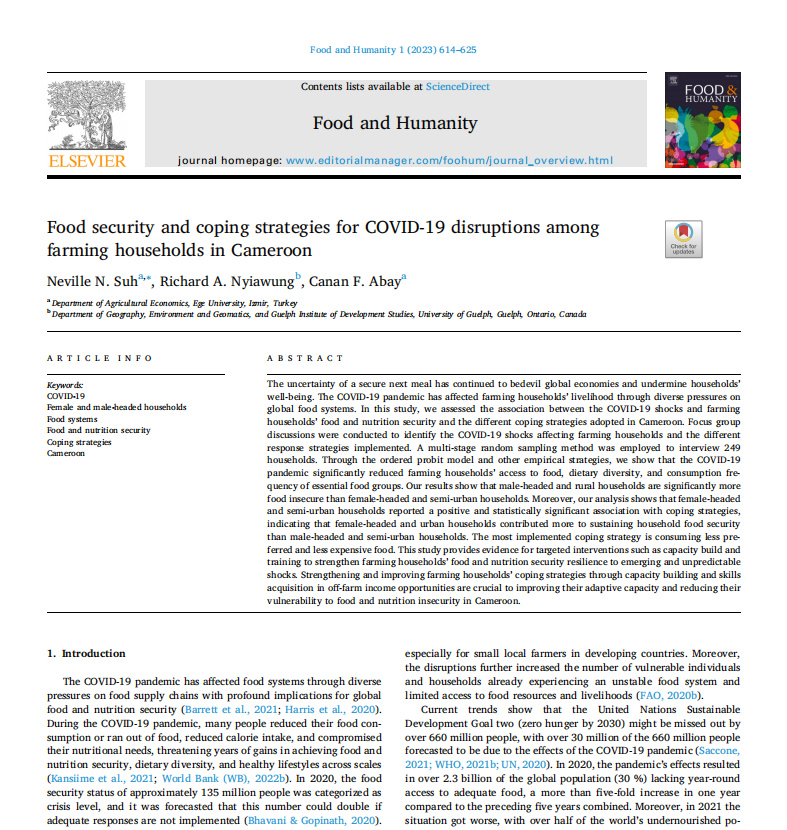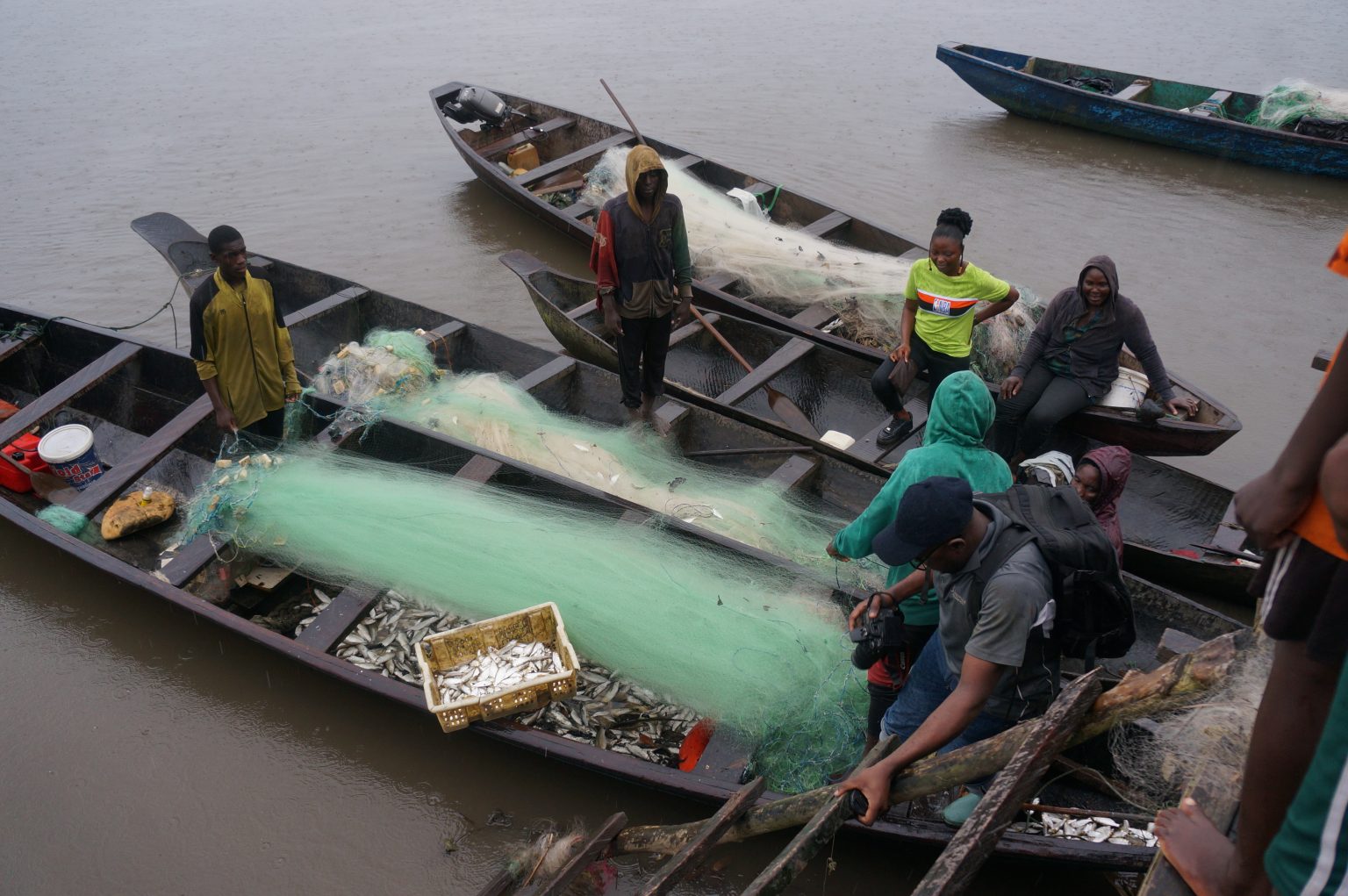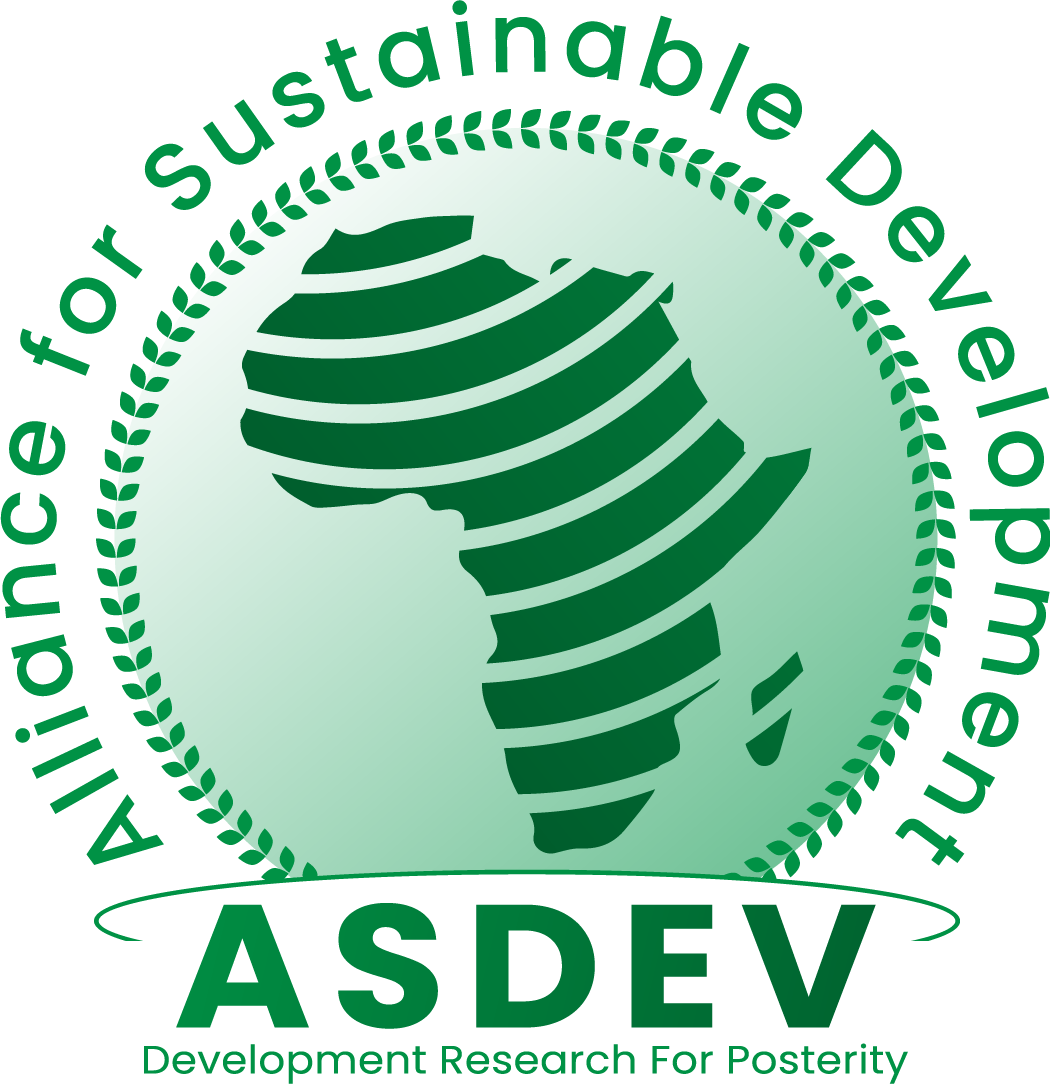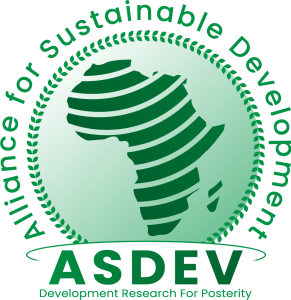ASDEV PUBLICATIONS
Our Most Recent Journals articles

Food security and coping strategies for COVID-19 disruptions among farming households in Cameroon
The COVID-19 pandemic has affected food systems through diverse pressures on food supply chains with profound implications for global food and nutrition security (Barrett et al., 2021; Harris et al., 2020). During the COVID-19 pandemic, many people reduced their food consumption or ran out of food, reduced calorie intake, and compromised their nutritional needs, threatening years of gains in achieving food and nutrition security, dietary diversity, and healthy lifestyles across scales (Kansiime et al., 2021; World Bank (WB), 2022b). In 2020, the food security status of approximately 135 million people was categorized as crisis level, and it was forecasted that this number could double if adequate responses are not implemented (Bhavani & Gopinath, 2020). The FAO (2020a) reports show that food import and mobility restrictions significantly disrupted global food production and supply chains, especially for small local farmers in developing countries. Moreover, the disruptions further increased the number of vulnerable individuals and households already experiencing an unstable food system and limited access to food resources and ... read more

Youth Recruitment and Retainment in Small Scale Fisheries
Small-scale fisheries (SSF) activities are the backbone of most coastal communities, providing income, food security, and a unique way of life and tradition to those engaged in it (Loring et al., 2013, 2019; Teh et al., 2020). SSF contributes almost 40% of global capture fisheries production and is an important employment opportunity for millions of people worldwide (Arthur et al., 2022; Food and Agriculture Organization [FAO], 2022). The growing demand for fish and fish-related products supports diversified, nutritious food and healthy diets worldwide (Bennett et al., 2018; Béné et al., 2016). However, SSF is considered to be in a “crisis” due to myriad threats from climatic and non-climatic stressors on fisheries’ resources (Adeleke et al., 2021; Béné, 2009; Islam & Herbeck, 2013; Kalikoski et al., 2019). Moreover, depleting fisheries resources and inescapable poverty traps caused by the adverse effects of multiple stressors are outspreading beyond physical impacts to other human dimensions, such as recruitment and retainment of young people in SSF-related activities (El Zoghbi & El Ansari, 2014; McClanahan et al., 2015; Mugambiwa & Dzomonda, 2018).... read more

Climate Change Dynamics and Youth Participation in Aquatic Food Systems
Aquatic food systems support the economic livelihoods and social wellbeing of millions of people in coastal communities [1], [2]. Aquatic foods also contribute to meeting the growing demand for nutritious food across the globe [3], [4]. In developing countries, aquatic foods are a rich source of essential protein and micronutrients for children and adults [5], [6]. However, climate-related stressors are affecting aquatic food systems, especially those in developing countries that are even more vulnerable and less resilient to the impacts of systemic and emerging shocks [[7], [8], [9]]. Moreover, there are projections that by 2050 fish production will decrease significantly due to climate change impacts [11], [10]. The increased vulnerabilities of resource-poor small-scale fishing communities to climatic stressors directly affect their livelihoods and sustainability [12], [13], [14], [15]. Most developing countries’ small-scale aquatic food system actors are unprepared to respond to climate change [16], [8], [17], including the ability to deal with the challenges and pressures of new shocks... read more

COVID-19 Pandemic, Farming Households’ Food and Nutrition Security, and Response Strategies in Ghana, West Africa
We explored the association between COVID-19 disruptions and food and nutrition security, including the various coping strategies adopted by farming households in Ghana. The different COVID-19 shocks experienced and coping strategies implemented by farming households are identified through focus group discussions. A multistage random sampling method was used to survey 252 farming households, and data were analyzed using different regression techniques. We observe no significant differences in the food and nutrition security status of male- and female-headed households, while the COVID-19 disruptions affected male-headed households more than female-headed households. Our data shows a higher vulnerability of urban households to food and nutrition insecurity than rural households, with the COVID-19 disruptions affecting urban households more than rural households. We find that the COVID-19 disruptions pushed households to reduce their frequency of food consumption, consume less diverse diets, and hinder their adoption of coping strategies... read more

Beyond gender roles in small-scale fisheries: The women who fish in Cameroon
Mabanda Kombo is a small, isolated island community surrounded by River Wouri and the Atlantic Ocean in Cameroon. As a gender-dynamic community, women and men participate in all fishing activities within the fisheries system. These gender dynamics are based on social norms and the historical foundation of the community, which permitted men and women to fish together. Women of Mabanda Kombo are involved in fish harvesting as a source of livelihood, just like men, an activity considered to be done only by men in many other fishing communities in Cameroon. There are even more women fishers than men, dominating in harvesting and post-harvest fishing activities. Typically, the women go fishing very early in the morning and depending on the catch, they either return by midday or late in the evening. Some even spend more days at sea trying to get more fish, especially as fish catch volumes continue to reduce... read more
Have a question?
Feel free to get in touch with us. For answers to all your questions and enquiries, we are always ready to listen. Get to us using the number below.

